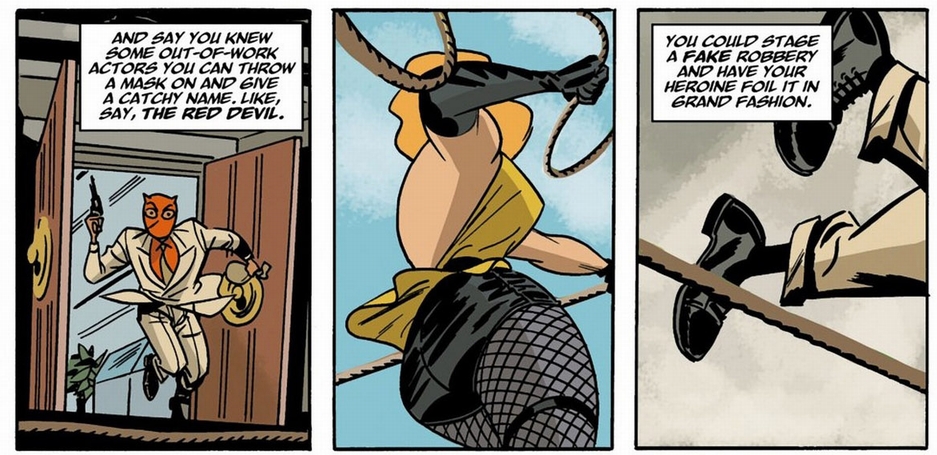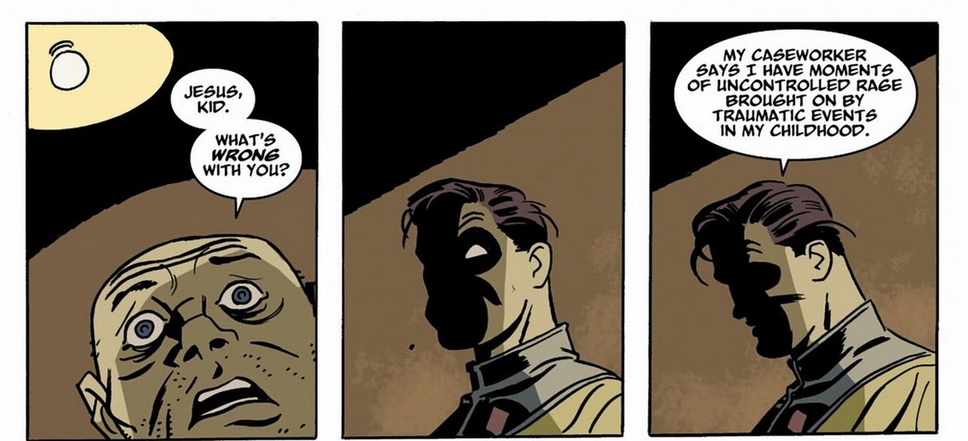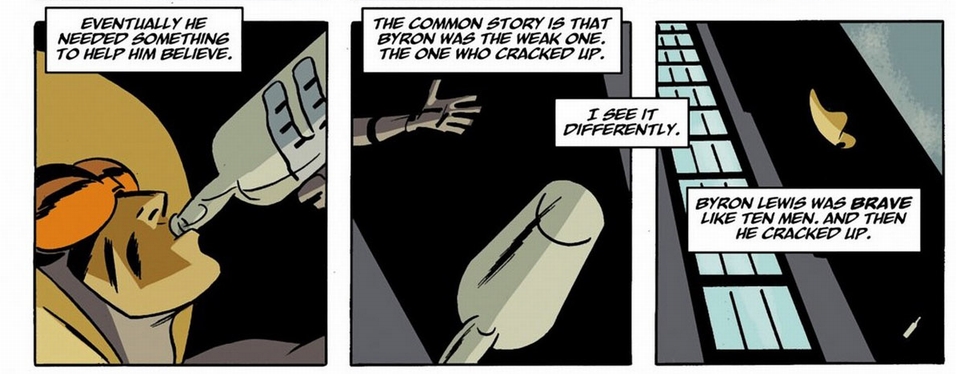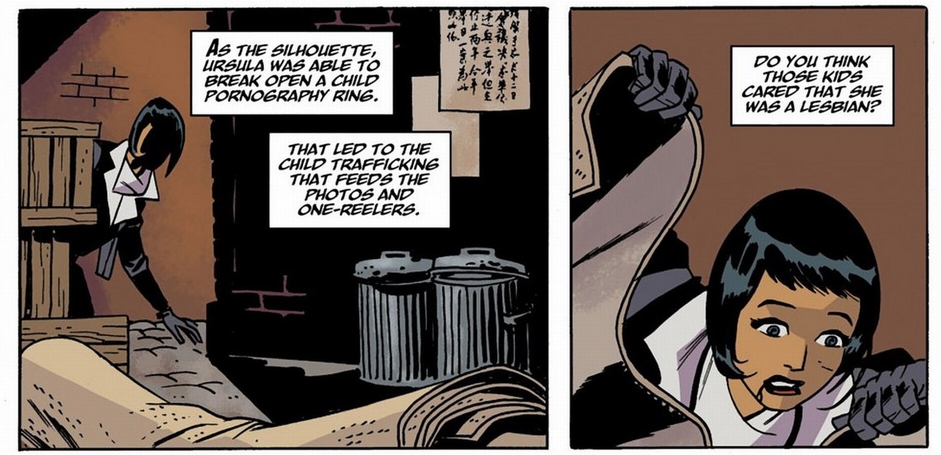1) Never insult writing, neither yours or anyone’s.
“I’ll just have to face the facts, girl, I’m no Tolstoi. Going for a philosophical end there isn’t going to work” Before Watchmen: Minutemen #1 p.3
You
may think this gives your writing humility, or in-universe it gives an
excuse for a character to not demonstrate the exceptional writing skills
he’s famous for, however it just shows poor penmanship. Disrespecting
your own or a character’s literary voice weakens the author’s authority.
The first page of any literary work is the opportunity for the author
to establish authority, to convince the reader to stay and enjoy the
story and this is achieved through two methods; be empathetic and appeal
to the reader’s emotions or appeal to the intellect and hand out
provoking thoughts. By saying: “This is terrible” (Op. cit p. 2) you
just lose everything you gained.
2)You shall not hang lampshades
Writing,
as any other craft, has conventions, these conventions are the
unwritten contract you and the reader sign when the work is purchased or
acquired, “I am going to tell you this story and here are the tools of
the trade I am going to use” In visual arts, such as the comic-book,
monologuing is accepted. Steve Ditko and John Romita Sr.’s Spider-Man
continually monologues as he spins his web around New York City, John
Byrne’s Superman monologues as he fights his way through War Machines in
The Man of Steel
miniseries, we have come to accept it. The original Watchmen always had
an explanation in-universe for monologuing. Rorschach’s Journal, he was
dictating to his own head and later sat down to write it, Doctor
Manhattan’s watching the past and the future happen at the same time,
Alan Moore used these conventions but somehow skipped the thought
balloons relying on expressions drawn by Dave Gibbons, both the words
and visuals perfectly married.
In
the hands of a much inferior writer whose only trick is: “look how
aware I am of how ludicrous comic book conventions are” this becomes
just that, a cheap trick for a quick laugh, that undermines the unspoken
contract between creators and readers, made worse by the fact that
monologuing is used in a straight way throughout the rest of the book.
3) Alternate Character interpretations belong to fanfiction, not in official releases (Brian Herbert’s Syndrome)
Derivative
works have a very tough job, they come after a established property and
while carrying their own goals they must still follow the original. The
biggest perpetrators of this is Marvel and DC Comics, their properties
have gone through dozens of creators while still trying to be
recognizable. Chris Claremont's run on X-men for many has been the
definitive interpretation of the characters, but after Claremont came
much inferior writers who killed off the characters they didn’t like and
resurrected the ones they liked., you cannot read Uncanny X-men as a novel, plots contradict themselves, characterization becomes poor and twists and turns are hard to keep track.
An
inferior writer will always try to establish credibility by correcting
or “improving” a character, he has always wanted or always though
something and when given the writer’s reins, feels free to explore. This
just weakens the character, The Silk Spectre is a respected
superheroine with equal footing to the rest of the Minutemen and
according to Darwyn Cooke she is just a “pretty face” throwing publicity
stunts while her “kike ass” (sic) husband and agent charges for her
appearances.
4)You shall not use “Dark and Gritty” 
The Dark Age of Comic Books, brought upon Watchmen and Frank Miller’s Daredevil and The Dark Knight Returns
began because artists wanted to copy that “Dark and Gritty” feel to the
original works without understanding that it was a result of the
deconstruction process. Deconstruction, in the case of Watchmen, meant exploring the consequences of having costumed adventurers running around. Before Watchmen
not only feels like ANY other comic book, playing the superheroics
straight, it gives The Comedian an artificial troubled past as a
justification for his latter fall, while the original novel guides
through that process and lets us gaze into what he has seen, and lets us
in his gradual descent, Here, The Comedian was born broken and just
recites psych-sounding nonsense. You never tell dark and gritty stories,
you just tell stories.
5)
Never give in to the temptation to justify one aspect of the source
material that wasn’t intended to have any further explanation.
The
original narrative of “Under The Hood” provides a laconic ending to the
heyday of the Minutemen, every one of the smiling heroes who seemed
larger-than-life (Except the too human Edward Blake, but that’s the
central theme of the novel) have sad endings. In the case of Mothman he
ends up in a mental asylum and is not given additional details, a moth
unceremoniously burned to a crisp by a candle.
Before Watchmen provides
a backstory and a justification to Mothman’s fall, he starts damaged
and fragile, the process of rise and fall subverted entirely. It removes
the counterpoint and the whole reason to have him as a character, these
are details that, while expanding to the existing mythos, add nothing
and detract from the overall mood of the piece. What you do not show is
as important as to what you show, and sometimes, when showing monsters,
the less you show the biggest and foreboding they are in the mind of the
reader, details just dilute that effect.
6)Never rely in the power of words themselves, specially for shock value.
Lisbeth Salander in Stieg Larsson’s Millenium series
is a bisexual as a thematic convention to show her detachment to
humanity itself and spiraling alienation, characters in Alison Bechdel’s
stories are lesbians because Bechdel herself is a lesbian and it is an
exploration of her own life, trying to make sense of it, Why is the
Silhouette a lesbian?
It’s part of the overall theme of the Minutemen in general, they really are mystery men.
we know nothing about their personal lives, their public personas are
empty masks, filled by no-ones, it’s because their deaths that we got to
peek a little into their lives. The idea that the comic book reader is
intimate with the masked hero’s real identity is subverted for the first
time in the extracts of Under The Hood, the revolutionary ideas is that not even a fellow hero knew anything about these men and women of mystery.
For
Darwin Cooke The Silhouette is a lesbian because she was in the source
material, and doesn’t show it, gives some kind of pseudoexistential
question, he fails to do a basic writer’s workshop's advice: Show, don’t tell.
And overall, he speaks about a “Child pornography ring” (for the year
of the story a child prostitution ring is more accurate, the child
pornography is a more contemporary fear) that we see nothing about. It’s
more than lazy storytelling, it just becomes name-dropping, a divorce
or the words and images and that is the ultimate sin in sequential art


The thing that bothered me the most was The Comedian, he is an allegory for the whole Watchmen theme; everyone's dark side. Reducing him to a cliche was just insulting, the whole line of comics is.
ReplyDelete